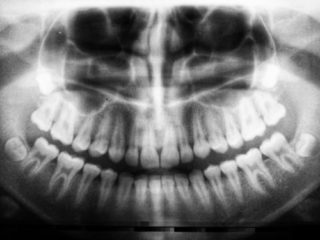Wisdom teeth are the third set of molars that develop in the back of both the top and bottom jaws of most individuals beginning at about age 12. These teeth commonly begin to come into view (erupt) in the mouth between the ages of 17 and 25 but typically do not have sufficient room to function in the mouth and be adequately cleaned.
Why should the wisdom teeth be removed?
 These non-functional teeth can lead to serious health concerns including damage to adjacent teeth, infection and formation of cysts within the jaws. Wisdom teeth removal is generally less complicated and easier to recover from at a younger age because the roots are shorter, the surrounding bone is softer and there is less chance of damaging nearby nerves and other important structures. Most patients elect to have their wisdom teeth removed while asleep.
These non-functional teeth can lead to serious health concerns including damage to adjacent teeth, infection and formation of cysts within the jaws. Wisdom teeth removal is generally less complicated and easier to recover from at a younger age because the roots are shorter, the surrounding bone is softer and there is less chance of damaging nearby nerves and other important structures. Most patients elect to have their wisdom teeth removed while asleep.
While it’s true that some people NEVER get their wisdom teeth and some individuals have no problems with their wisdom teeth when they appear, many people develop what is referred to as “impacted” wisdom teeth, which is a fancy word that describes the fact that there simply isn’t enough room for these teeth to emerge and develop normally.
That’s a huge problem. Impacted wisdom teeth will not only likely grow at a strange angle but can also cause problems that affect your oral health as well as your overall health and well-being. With impacted wisdom teeth, you’ll likely have some pain but could also experience:
- Damage to a nearby molar
- Damage to the surrounding bone
- Gum disease or infection
- Potential tooth decay in any partially erupted wisdom teeth
- Cysts around the impacted teeth
- Interference with orthodontics
What if they’re not causing a problem?
Plenty of people have impacted wisdom teeth that don’t appear to be causing any pain or issues with their oral health in general. So, is it okay to leave those alone or do most specialists take a “better safe than sorry” approach with these teeth?
While there are different schools of thought about this, it’s true that these teeth can still become diseased, even though they can’t be seen. In addition, if there’s no room for them to erupt, chances are there could be problems that pop up in later years, and most oral surgeons will concur that there are fewer risks with surgery when the patient is young than when they are older.
While most extractions don’t result in complications, co-existing conditions in older patients can be a cause for concern with any kind of surgery. So, if your dentist suggests removal, the sooner the better.
Are there risks associated with wisdom teeth extraction?
All surgery carries a certain amount of risk so there’s always a possibility that something could go wrong during or after the procedure. The most common complications could include the following.
- Patients sometimes experience a dry socket, which is when the blood clot at the site of the tooth extraction fails to develop, or it dislodges or dissolves before the wound has healed. It’s a painful condition that can also cause a foul odor and an unpleasant taste in the mouth. A dry socket should be immediately addressed by your oral surgeon.
- Patients could potentially get an infection from trapped food particles or bacteria. Keeping the mouth clean is essential.
- Rarely, damage to gums, other teeth, nerves, or the sinuses could occur.
Some pain is to be expected with the extraction of wisdom teeth, but if anything seems out of the ordinary, your surgeon or dentist should be contacted immediately. That includes: - Severe pain that is not relieved by prescription or over-the-counter pain relievers
- Excessive bleeding
- Oozing or pus in the socket
- Swelling that worsens rather than subsides
- Fever
- Difficulty breathing
Questions about the surgery
Once it’s determined that having the wisdom teeth removed is right for you or your child, your dentist or oral surgeon will take the time to explain the procedure to you in detail. He/she will describe:
- what will be done during the procedure
- the type of anesthesia/sedation that will be used
- the length of the procedure
- recovery time and process
- pain management
- eating and drinking after surgery
- activity after surgery
and much more.
If you have any questions that aren’t answered during your consultation before the surgery, be sure to ask them. Your surgeon wants you to be at ease about the extractions and will do everything possible to make you comfortable before, during, and after the procedure.
